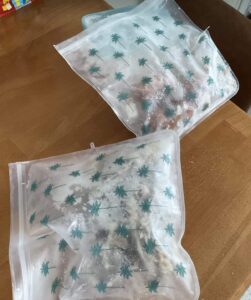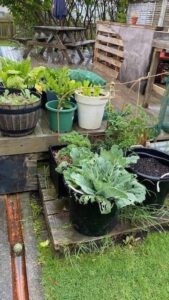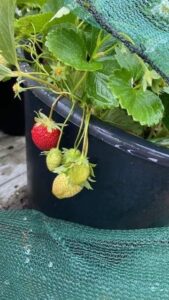Growing Green: Casey’s Urban Composting Journey
North Shore-based Casey Namana tells us about his composting and gardening journey. His passion began with his grandad’s imparting knowledge, coupled with a mother who is also a keen gardener, and the willingness to learn, Casey is a role model to others starting their composting journey.
Tell us a bit about yourself, and how you started composting.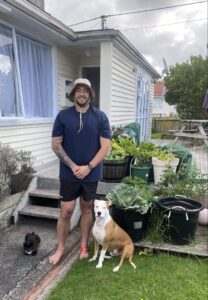 My name is Casey Namana, I am 30 years old, I am from Whangārei, and I have been based in Auckland for the last 11 years, while travelling for work. I joined the Navy at 19, and recently got a posting which allows me to live in Auckland for longer than six months, and put down some roots.
My name is Casey Namana, I am 30 years old, I am from Whangārei, and I have been based in Auckland for the last 11 years, while travelling for work. I joined the Navy at 19, and recently got a posting which allows me to live in Auckland for longer than six months, and put down some roots.
I moved into Navy housing in Bayswater with my partner and have always had a green thumb. My grandad used to show me how to make a garden and how to plant and prune the garden. He would show me how to use kina juice/shells as fertiliser when he was letting the soil rest during winter and autumn before we would plant for the summer. He showed me how to make use of small areas because we were never allowed to have a garden at our houses.
In 2016 I bought my mother a house in Whangārei so we could take my grandfather in while I was working overseas in the Navy. I told him he could have a garden as big as he liked. He taught my mother all of his tricks and when he was too old to get in the garden she took over. Now me and my mother are both swapping plants or seeds or how we do things. That’s how I got into gardening and composting.
What composting method(s) do you use?The housing department that looks after the house we live in had soil samples taken, and the results came back saying we had high traces of lead and asbestos in the soil. We were advised not to grow anything in the ground, so I decided to use containers, growing enough vegetables for myself and my partner through learning what works and what doesn’t.
I do have a traditional compost bin, but because of the lead and asbestos in the soil, it’s just there to decompose the food scraps so they don’t end up in landfill. It seems like a bit of a waste. I am going to use the discount voucher from the workshop I attended last month towards buying a worm farm, and look forward to giving that a go!
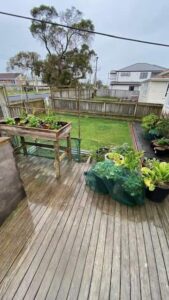
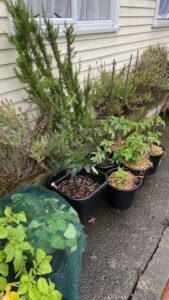
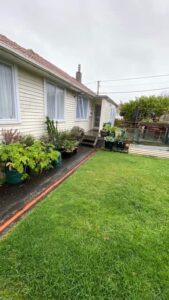
What do you compost?I compost 90% of our food scraps, from the banana skins I use as fertiliser, lemon skins in cakes, egg shells go onto the soil to stop slugs, and I make broth from bones. All these things I learned from my grandad, mum, and the internet. When I get a fire pit, hopefully for Christmas or my birthday, I’ll burn the bones and try to grind them down so I can use the bone meal for something.
What do you enjoy about composting?I enjoy it because it makes me feel connected to a natural skill and the whenua at all times. I had lost that connection being away from home for so long. And, it’s easy to compost – it’s just about being consistent with mixing the browns and greens (food scraps) to keep it alive.
Have you faced any challenges while composting, and what have you learnt? 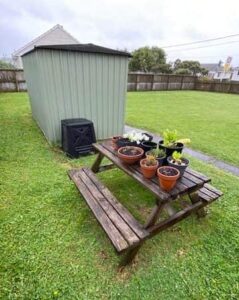
What I’ve struggled with is trying to figure things out as I go. But, with the help of the internet and workshops like those run by the Compost Collective, I’ve been able to add things to my kete to build my knowledge, which I can hopefully pass on too. There are signs I know to watch out for now, with both the plants I grow and my compost, so I can react faster to ensure I don’t kill my plants or saturate my compost.
What would you say to people starting their composting journey?I’d say start small. Begin with one thing only, perhaps one composting system, and get your family involved. Doing it together is a good way to learn a new skill for later down the track. Living a more self- sufficient and sustainable lifestyle can be achieved in the city as well. You just need to be consistent and connected!
About the Compost CollectiveThe Compost Collective hosts free composting workshops across the Auckland region, where you can learn about the three main home composting methods; composting bins, Bokashi and worm farms, and decide which one is right for you. Check out the workshop calendar for a date that suits you. All registered participants get a $40 voucher towards the composting system of your choice, after attending the workshop.
EcoMatters and Kaipātiki Project work in partnership to deliver the Compost Collective, thanks to Auckland Council.
